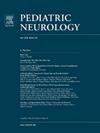Cyclical Vomiting Syndrome in Individuals With BPTF Haploinsufficiency
IF 2.1
3区 医学
Q2 CLINICAL NEUROLOGY
引用次数: 0
Abstract
Background
Haploinsufficiency of the bromodomain PHD finger transcription factor (BPTF) gene, essential in chromatin remodeling, leads to a neurodevelopmental disorder characterized by dysmorphic facies, distal limb anomalies, neurological disturbances, epilepsy, and gastrointestinal symptoms.
Methods
Families with BPTF-related neurodevelopmental disorders, with or without gastrointestinal symptoms, were recruited through an international collaboration. Data were collected via questionnaires on demographics, clinical features, genetics, and comorbidities, focusing on cyclical vomiting syndrome (CVS). CVS was diagnosed using criteria from the International Classification of Headache Disorders, 3rd edition (ICHD-3). Genetic variants were analyzed for pathogenicity, and effectiveness of therapies was assessed.
Results
We enrolled 15 individuals with likely pathogenic/pathogenic BPTF variants (median age: 8.8 years). Three individuals (20%) were diagnosed with CVS, and an additional four individuals (26.7%) met at least three of the ICHD-3 criteria for CVS. Among these seven individuals, the median age at onset of recurrent vomiting episodes was 3 years. In all seven individuals, recurrent vomiting episodes, typically lasting under an hour, were triggered by poor sleep (50%) and fever (66.7%). Acute therapy (ondansetron or domperidone) was administered in 42.8% of cases, and prophylactic therapy was provided in 57.1% of cases with cyproheptadine, levetiracetam combined with lamotrigine, and domperidone; all therapies were associated with clinical benefit. Episodes disrupted families’ daily lives, causing emotional stress (85.7%) and routine disruptions (85.7%).
Conclusions
This study broadens the syndromic phenotype associated with BPTF haploinsufficiency, highlighting CVS as a core feature. The findings raise clinician awareness, guide management, and enhance understanding of this rare condition.
BPTF单倍不全患者的周期性呕吐综合征
背景溴域PHD指转录因子(BPTF)基因在染色质重塑中至关重要,其单倍性不足可导致以畸形相、远端肢体异常、神经障碍、癫痫和胃肠道症状为特征的神经发育障碍。方法通过国际合作招募有或无胃肠道症状的bptf相关神经发育障碍家庭。通过人口统计学、临床特征、遗传学和合并症的问卷调查收集数据,重点是周期性呕吐综合征(CVS)。CVS的诊断标准来自国际头痛疾病分类,第三版(ICHD-3)。分析遗传变异的致病性,并评估治疗的有效性。结果:我们招募了15名可能具有致病性/致病性BPTF变异的患者(中位年龄:8.8岁)。3人(20%)被诊断为CVS,另外4人(26.7%)符合至少3个ICHD-3标准的CVS。在这7个人中,复发性呕吐发作的中位年龄为3岁。在所有7名患者中,反复呕吐通常持续不到一小时,由睡眠不足(50%)和发烧(66.7%)引发。42.8%的病例给予急性治疗(昂丹司琼或多潘立酮),57.1%的病例给予预防性治疗,使用环庚啶、左乙拉西坦联合拉莫三嗪和多潘立酮;所有疗法均与临床获益相关。发作扰乱了家庭的日常生活,造成情绪压力(85.7%)和日常生活中断(85.7%)。结论本研究拓宽了与BPTF单倍不全相关的综合征表型,突出了CVS为核心特征。研究结果提高了临床医生的认识,指导管理,并加强了对这种罕见疾病的理解。
本文章由计算机程序翻译,如有差异,请以英文原文为准。
求助全文
约1分钟内获得全文
求助全文
来源期刊

Pediatric neurology
医学-临床神经学
CiteScore
4.80
自引率
2.60%
发文量
176
审稿时长
78 days
期刊介绍:
Pediatric Neurology publishes timely peer-reviewed clinical and research articles covering all aspects of the developing nervous system.
Pediatric Neurology features up-to-the-minute publication of the latest advances in the diagnosis, management, and treatment of pediatric neurologic disorders. The journal''s editor, E. Steve Roach, in conjunction with the team of Associate Editors, heads an internationally recognized editorial board, ensuring the most authoritative and extensive coverage of the field. Among the topics covered are: epilepsy, mitochondrial diseases, congenital malformations, chromosomopathies, peripheral neuropathies, perinatal and childhood stroke, cerebral palsy, as well as other diseases affecting the developing nervous system.
 求助内容:
求助内容: 应助结果提醒方式:
应助结果提醒方式:


